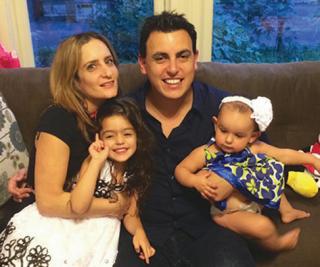God promised Abraham, “For all the land that you see I give to you and to your descendants forever” and “for an everlasting possession” (Genesis 13:15 and 17:8, respectively).
For those born and reared in Israel, who by birth already possessed a place in the land, what would prompt an Israeli to emigrate to the United States and to Wisconsin in particular? Although there are some broad commonalities, no one experience is the same.
Ofir Amram, raised in Netanya to parents born in Yemen, never intended to stay in the US. “It wasn’t part of a plan. I came for temporary work at kiosks in a mall and met my wife in Milwaukee.”
Eight years later, with three daughters and his own landscaping company based in Mequon, “the ultimate goal is to be back in Israel,” where his daughters could, “grow the way that I grew, where religious holidays are national holidays, experience the great food and the good of the country.”
Amit and Keren Rosenberg, Appleton residents since 2012, also face similar challenges in raising their daughters. Amit, who grew up in Raanana, said, “We have to work harder for our identity and culture than if we were in Israel. We are secular people, but here we put more emphasis on Jewish traditions than we would have in Israel for the identity of our children.”
Even the way their children meet other children is different. Keren, who grew up in Tel Aviv, noted, “In Israel we don’t have play dates. We don’t plan it, it just happens. I can go to a playground, meet another mom, and soon afterwards we’re invited to her home. In Appleton we need to open a calendar and set a play date. With American families, it’s all about planning ahead.”
Ronen Eliyha, originally from Kiryat Ata, Haifa, owns a clothing store in Door County where he has lived for the past fifteen years, and before that in Florida for several years, expressed a similar experience. “To go to a friend you have to call and make an appointment like a week ahead. In Israel, you knock on the door.” On the other hand, “It’s hard to compare anymore because I’ve lived here more than I lived in Israel,” said Eliyha.
“No matter how long I am here, my best friends and the people I connect to most are still Israelis,” said Ronen. For example, he met an Israeli gentleman from Tennessee and they became best friends.
Yet, that’s just the point. There are few Israelis that live in small town, Wisconsin. It’s a point not lost to the Rosenbergs who lament that there are so few Israelis in Appleton.
“I would like to connect with other Israelis to have our own group. In the big cities you can find other Israelis. We don’t have it here. I want Israeli people to get together to have a monthly meeting, or a newsletter or Facebook group,” said Keren.
Giora Katz, originally from Jerusalem and now working as a doctor in Manitowoc, captures how he views the overall challenge by referring to the US as galut (exile). Katz noted, “Israeli Americans need to understand that they made a choice to live in the galut which implies a totally different set of responsibilities and risks. Their Jewishness and Jewish institutions are no longer taken for granted, and therefore need to integrate into the Jewish community and connect with a synagogue. They must partner to maintain Jewish life, support Zionism and the State of Israel, and teach Hebrew to their children.”
It’s a concern that prompted Katz to attend a conference last November sponsored by the American Israeli Council (IAC), as Katz put it, “a forum that may help Israeli Americans be more active and generous towards their ‘Israeliness’ and Jewishness, to promote an identity of Israelis permanently living in the USA.”
That’s not to say there aren’t advantages to living here. Katz, Eliyha, and Amram all noted the ease and comfort of living here versus in Israel, “particularly in Wisconsin,” said Eliyha, where “People are more laid back.”
Despite what one hears about a growing Israeli economy, “There are more opportunities here, bigger resources,” said Amram. Opportunity is what brought the Rosenbergs to Appleton. Keren is a program manager for United Way Fox Cities and Amit works in global marketing for Kimberly Clark.
Although scheduling a play date, “makes it less frequent and is less welcoming,” said Amit, in terms of corporate life he appreciates “the ability to plan ahead and to look much more into the future. In Israel you focus more on the here and now because things change dramatically and quickly in Israel. In Appleton, Wisconsin, things don’t change so radically.” Keren also appreciates how business life is “more organized, how Americans get more into details which makes it easier for me.”
Maintaining ties
Thanks to technology, it’s easier than ever to maintain contact with family and friends in Israel. All those interviewed maintain close contact with family members and friends, by phone and online. The Rosenberg, Katz, and Amram families try to visit Israel at least once a year. On occasion, members of the Rosenberg family that live in Israel visit Appleton, and members of the Eliyha family visit Door County.
Members of these four families who still live in Israel feel no resentment towards their respective family members for emigrating. While it’s challenging for everyone to be so far away, “they respect my choice,” said Eliyha. All those interviewed make an effort every day to keep abreast of Israeli news. Amram said, “I open up ynetnews.com to see what’s going on in Israel before I open any news from here in the US.” (Ynetnews.com’s tagline is “Israel at your fingertips.”) And Israelis in Wisconsin will have opportunities to connect with each other through a forthcoming initiative by the Milwaukee Jewish Federation, which is still in the development stages.
Whether everyone interviewed will remain in Wisconsin for the rest of their lives remains to be seen. “That’s the million dollar question,” said Amit. “One day we’re going to be there in Israel,” said Eliyha, “no matter how comfortable the way of life is here, you always want to go back home.”
Joshua Becker is a Spanish teacher for Shorewood Public Schools and a freelance writer.



